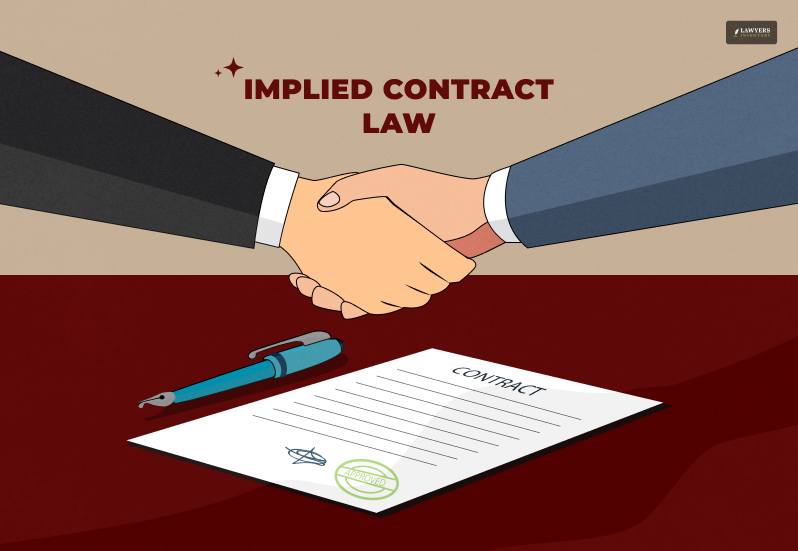
If you are in the world of law and contracts, it is obvious that you will not know much about implied contract law.
We expect that people with whom we enter into agreements will fulfill their half of the bargain. However, things don’t always go as expected. The law can offer protection even in the absence of a formal contract.
Under implied contract law, agreements that are inferred from the conduct and circumstances of the parties involved but that neither party has expressly stated are recognized. When it comes to settling conflicts and guaranteeing justice, this legal idea can be quite effective.
On the other hand, a breach of contract may result from one party’s failure to fulfill their responsibilities.
In this blog, I will go over the specifics of implied contract law and show you how to use it to stop or deal with these kinds of situations.
So, keep on reading this blog till the end to learn more…
Understanding Implied Contract Law
A legal framework known as implied contract law acknowledges agreements between parties in the absence of a written contract.
Its premise is that even in the absence of written documentation, circumstances and acts can give rise to a legally enforceable agreement.
Implied contract law examines the actions and exchanges between the parties. If one party behaves as though there is an agreement and the other party agrees or follows suit, then there may be an implied contract.
Unlike in the case of express contracts, verbal agreements, emails, or even just a consistent pattern of behavior over time can be examples of this.
Additionally, for an implied contract to exist, there must be:
- An offer and acceptance
- Consideration (something of value exchanged)
- Intent to create a binding agreement
People often use implied contract law when there’s no written contract, but the parties’ actions suggest an agreement was intended. It can provide a way to resolve disputes and ensure fairness, even without a formal contract.
How Does an Implied Contract Law Work
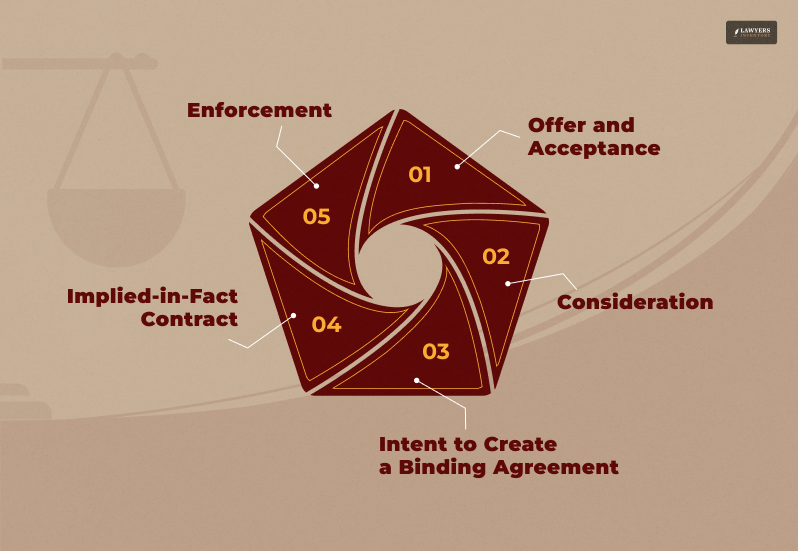
As you might have understood by now, implied contracts are completely verbal. This means that neither party explicitly agrees upon the terms of these contracts when they enter into the contract.
So, how does this work? And how does this get legal?
Well, it all depends on the elements of the contract. Implied contract law implies an agreement between parties based on their actions and circumstances.
Here’s how it works:
- Offer and Acceptance
- Consideration
- Intent to Create a Binding Agreement
- Implied-in-Fact Contract
- Enforcement
Types of Implied Contracts
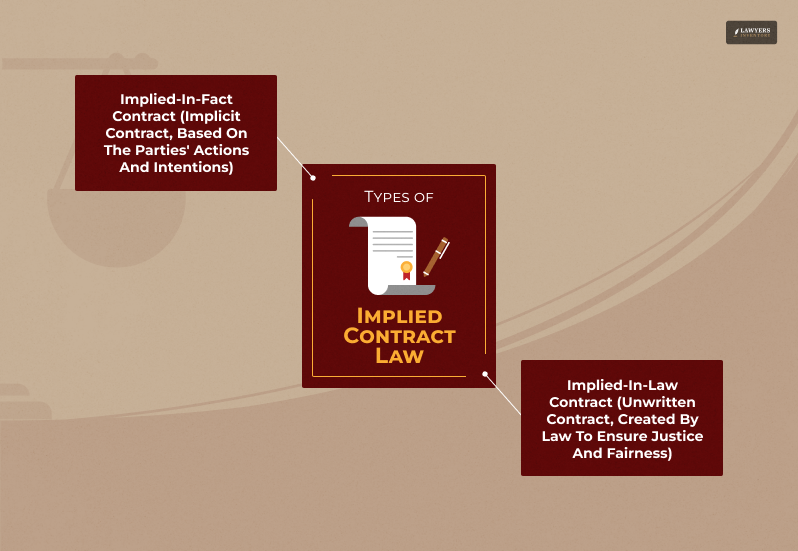
There are two main types of implied contract. They are:
- Implied-in-Fact Contract
- Implied-in-Law Contract
The acts and conduct of the parties create an implied-in-fact contract. In this case, it creates an implicit contract.
On the other hand, an implied-in-law contract, also known as a quasi-contract, is another term for the other kind of unwritten contract. Neither side intended for it to become a legally enforceable agreement.
In summary, implied-in-fact contracts are based on the parties’ actions and intentions, while implied-in-law contracts are created by law to ensure justice and fairness.
Let me give you an example of the two.
John hires Jane to paint his house. They agree on the price and scope of work but don’t sign a contract. Jane starts painting, and John pays her for the work done. This is an implied-in-fact contract because we can see an intention in their actions and circumstances that suggest an agreement.
Then what would happen in the case of an implied-in-law contract?
Let’s say that John takes his car to Jane’s repair shop for maintenance. Jane fixes the car, but John doesn’t pay. A court may imply a contract existed, even if none was written, because Jane’s services had benefited John, and he should compensate her. This is an implied-in-law contract created by law to ensure fairness.
When Should You Get an Implied Contract Law
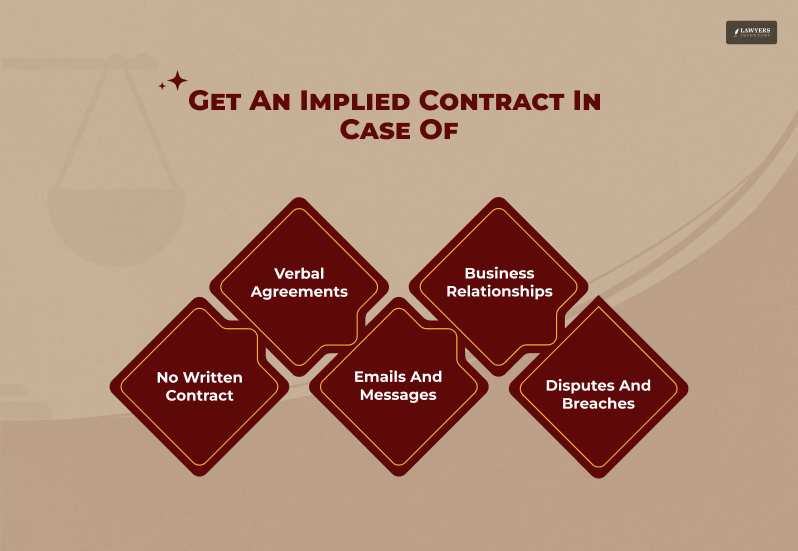
You must look at the implied contract law whenever there is no written contract. Let me tell you some instances when you might want to get an implied contract:
No Written Contract
If you’ve agreed to do business with someone but didn’t sign a written contract, implied contract law can protect your rights. This is common in small businesses, freelance work, or everyday transactions.
Verbal Agreements
If you’ve verbally agreed with someone, implied contract law can enforce it. This includes promises, commitments, or understandings made in person, over the phone, or via video calls.
Emails and Messages
If you’ve exchanged emails, texts, or messages that suggest an agreement, implied contract law can apply. This includes online transactions, negotiations, or discussions.
Business Relationships
Implied contract law can govern business relationships, such as partnerships, joint ventures, or collaborations. If the parties’ actions suggest an agreement, implied contract law can fill the gaps.
Disputes and Breaches
If a dispute arises or one party fails to meet their obligations, implied contract law can help resolve it. It can establish the terms of the agreement and provide a basis for legal action.
Conditions for an Implied Contract Law
Now, for an Implied Contract to exist, there needs to be certain conditions. These will solidify the contract and help the parties in case of a breach.
Here are the conditions necessary for an implied contract to be in place:
Offer and Acceptance
The first condition for an implied contract law is an offer and acceptance. This means one party must make a clear offer, and the other must accept it.
Either of the parties might imply a contract verbally or in a written manner through actions. It must be specific, definite, and communicated to the other party.
For example, if someone says, “I’ll pay you $100 to paint my house,” that’s an offer. If the other person responds with, “Okay, I’ll do it,” that’s acceptance. This exchange creates an oral contract, even if nothing is written down.
Consideration
The second necessary element for the existence of an implied contract is consideration. It alludes to a valuable exchange taking place between the parties. This exchange can involve cash, products, services, or even commitments to carry out particular tasks.
In other words, in exchange for a promise or action, one party has to give the other party something of value. Payment is a consideration, for example, if someone offers to paint a house for a fee.
In a similar vein, consideration is implied when someone offers to paint a house in return for the homeowner’s vow to refer them to others. An implied contract cannot exist in the absence of this value exchange.
Intent to Create a Binding Agreement
The third condition for an implied contract is the intent to create a binding agreement. This means both parties must intend to be agree by the terms of the agreement.
In other words, they must believe they are entering into a contract and be willing to accept its obligations. This intent can be inferred from their actions, words, and circumstances.
For example, if two parties negotiate and agree on terms but don’t sign a contract, their intent to agree by the agreement can be implied from their behavior and communications. This intent is crucial to establishing an implied contract.
Implied-in-Fact Contract
The fourth condition is an implied-in-fact contract, which results from the acts and circumstances of the parties is the fourth requirement.
This implies that they may have intended to enter into an agreement based on their actions and circumstances.
If a homeowner consistently pays a gardener for services rendered without a written contract, for example, there is an implied-in-fact contract in place.
Even in the absence of a written agreement, the parties’ conduct suggests one. Rather than using precise language, this kind of agreement is based on the actions and circumstances of the parties.
Reasonable Expectations
The fifth condition is reasonable expectations. This means both parties must reasonably expect an agreement to exist based on their actions and circumstances.In other words, a reasonable person would assume a contract exists, given the situation.
For example, a reasonable person would expect an agreement to exist if a contractor builds a deck without a written contract, but the homeowner pays for materials and labor. This expectation is essential to establishing an implied contract.
No Written Contract
The sixth and final condition is the absence of a written contract. If a written contract exists, it takes precedence over any implied contract.
However, an implied contract may be created based on the parties’ actions and circumstances if there is no written contract.
If two parties intend to enter an agreement but fail to put it in writing, an implied contract can still be formed. The lack of a written contract allows the implied contract to fill the gap.
Wrapping It Up!
When there isn’t a written contract, but there is evidence of an agreement between the parties based on their conduct, implied contract law is crucial.
It can manage business relationships, uphold verbal agreements, and safeguard your rights. If you’re unsure whether implied contract law applies in your case, speak with a legal expert.
I hope this blog has been helpful if you were looking for the definition and guidelines of implied contract law.
I would be happy to answer any further questions you may have about this. Simply keep scrolling down until you get to the bottom of the page.
Then, post your thoughts in the space provided below. And I’ll be here to respond to all of them!
Read More…
- What is The Purpose Of The Contract?
- What Is A Contract Lawyer? What Does A Contract Lawyer Do?
- 5 Things To Be Included In An Employment Contract For Freelancers






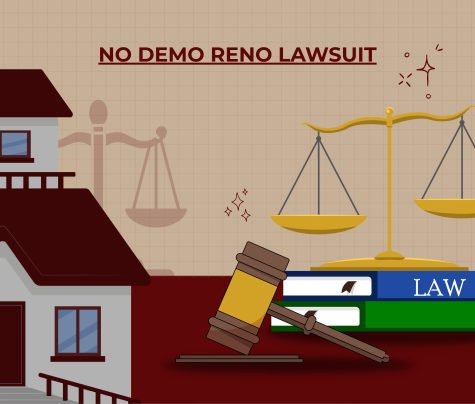




0 Reply
No comments yet.